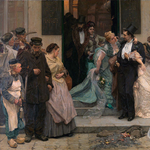Leven, wonen en werken in onzekere tijden. Patronen van bevolking en arbeid in België in de 'lange negentiende eeuw'
DOI:
https://doi.org/10.18352/bmgn-lchr.5832Keywords:
Demography, Housekeeping, Economic historyAbstract
Lifestyles, living conditions and employment in uncertain times. Population and employment patterns in Belgium during the 'long, drawn-out nineteenth century', Eric VanhauteIn recent decades, historic-demographic research has asked new questions, used new sources and experimented with new methods. Yet these innovative trends which have produced a wealth of findings, have failed to revive the debate about broad, overarching patterns and models, which is still dominated by all-encompassing modernization concepts such as the 'demographic transition'. This article argues for a renewed, unbiased dialogue between micro and macro approaches and formulates some ideas about bridging the gap between the rich but splintered domain of demographic micro research and historicising models of social transitions. A survey is presented on the accumulated knowledge about important transitions in demographic trends witnessed
in 19th century Belgium: Population growth, birth rates, death rates, nuptuals and fertility, conditions in which people lived together and family formations, as well as housing and employment. These processes are subsequently interpreted within the context of the structural transition to an 'extensive' 19th century and an 'intensive' 20th century social model, respectively.
Downloads

Downloads
Published
Issue
Section
License
Authors who publish with this journal agree to the following terms:
a) Authors retain copyright and grant the journal right of first publication with the work simultaneously licensed under a Creative Commons Attribution 4.0 International (CC BY 4.0) that allows others to share the work with an acknowledgement of the work's authorship and initial publication in this journal.
b) Authors are able to enter into separate, additional contractual arrangements for the non-exclusive distribution of the journal's published version of the work (e.g., post it to an institutional repository or publish it in a book), with an acknowledgement of its initial publication in this journal.
c) Authors are permitted to post their work online (e.g., in institutional repositories or on their website) prior to and during the submission process.
Authors are explicitly encouraged to deposit their published article in their institutional repository.








